Overall, the essay series serves as a call to reimagine our politics to address contemporary challenges by reviving the foundational questions of political life, aiming to reinvigorate public discourse with moral and ethical considerations about the societies we aspire to create.
How did we get here?
Politics is world-building – the worlds in which we live out our lives are the worlds that our politics has built.
None of us choose the circumstances in which we are thrown into these worlds, but all of us choose what to do with the circumstances we are given.
Inevitably, our circumstances and our choices mean we are all bumping up against each other constantly, both physically and ideologically.
Every single time this happens anywhere, big questions are at stake:
- What is real? (the ontological question)
- How do we know? (the epistemological question)
- What should we do? (the ethical question)
- What do we owe to each other? (the justice question)
- How will we navigate our differences? (the political question)
Politics is what happens when your answers to these questions collides with mine.
Our worlds are built from the tiny fragments of this infinite and ongoing constellation of constant collision between our invisible assumptions about life's biggest questions.
No wonder it's all a bit of a mess.
The answers to the Big Questions are never settled for ever, or even for long. What we call social order and political stability is better thought of as a temporary settlement.
Zoomed out, these temporarily settled forms of political life drift around like the continents of our physical world, occasionally bumping into each other or breaking away into new forms, freezing through long winters, or disappearing beneath the waves.
I won't stretch the metaphor too far, but I trust the point is clear – it's all drift and nothing has to happen the way it does – nothing is certain and everything is contingent.
To me, the weirdest thing about our particular political moment is that everything feels broken but nothing feels like it can be changed. And yet we made this. Why did we make it like this?!
If all settlements are temporary, nothing is certain, and everything is contingent, why is it so difficult to imagine alternatives, let alone collectively engage in the actions of world-building that would bring them about?
If all settlements are temporary, nothing is certain, and everything is contingent, why is it so difficult to imagine alternatives, let alone collectively engage in the actions of world-building that would bring them about?
You know what else is interesting?
I can imagine almost anyone reading this far – no matter what their political ideas and beliefs – and mostly nodding their head in agreement.
And yet here we are.
As the critical theorists say, the greatest obstacle to change is the way things already are. And as the Zen saying goes, the obstacle is the way.
The particular political world I was thrown into at birth is the world of liberal democracy – specifically the kind of liberal democracy of a middle-power (Australia) towards the end of the Cold War. I grew up in the 1990s and, like many who share similar circumstances, my formative political experience was the September 11 attacks of 2001 and all that came after.
That is to say, I grew up in a time when liberal democracy seemed like it had incredible – inevitable? – moral authority and legitimacy.
And today? Well, many of us would disagree about what happened or what to do about it, but few of us would say liberal democracy looks in great shape at the moment.
Most of us would probably go further and agree that liberal democracy is in the midst of a crisis right now – both in the sense of lacking convincing authority and legitimacy, and in the Ancient Greek sense of a crisis as a crossroads – a decision point.
Thus far, we have agreed on much.
Over the years, I have given a lot of thought to the nature of liberal democracy's crisis. In 2014, back when I was seriously contemplating an academic path, I put some serious research and storytelling muscle into it through the lens of political philosophy.
Looking back at what I wrote then, almost all of it seems just as valid and urgent, only moreso.
To drive home this point – everything I wrote about the crisis of liberal democracy's authority and legitimacy came before Brexit, Trump, Me Too, George Floyd, Greta Thunberg, Covid, generative AI, the latest Russia-Ukraine and Israel-Palestine conflicts, and everything else that didn't make this brief list of world events since 2014.
I want to share these ideas with you today.
What follows in this essay series represents my own thinking on and extended answers to life's big questions, and ultimately what grounds my hopes for a way out of our present crisis.
The attentive reader will also see a reflection of my ideas about the kind of human flourishing and public space that I am trying to cultivate through Grokkist – my own project of world-building.
Where the opportunity presents itself, I have tried to update and adapt what I wrote in 2014 for added relevance and resonance in today's political climate.
If you're familiar with my other work, you'll know that even with the most complex topics, I strive to maintain an accessible and conversational style without sacrificing depth or nuance. That is still the case here, though you may find this essay series is more dense and requires more effort to follow than usual as it is ultimately intended as a serious contribution in the realm of political philosophy.
And now, with all that said, let's begin our world-building adventure together.
The past isn’t over
The end of the world has been announced many times, but I want to tell you about the time it ended on October 14, 1806.
This was when Napoleon’s armies fought the Battle of Jena, prompting the German philosopher Hegel to write that this event had ushered in ‘the last stage of History, our world, our own time.’
History, Hegel insisted, had a direction and a purpose. This purpose unfolded in ‘stages of human freedom, from the public freedom of the polis and the citizenship of the Roman Republic, to the individual freedom of the Protestant Reformation, to the civic freedom of the modern state.’
By making possible the rational bureaucratic state, Napoleon’s conquest of Europe was part of a long chain of ‘world-historical’ events that brought about the final stage of human freedom, making possible the ultimate perfection of humanity.
The hitching of human nature and political affairs to the chariot of destiny is a common theme in Enlightenment thought. Herbert Butterfield called it the ‘Whig’ view of history:
[T]he whig historian can draw lines through certain events, ... and if he is not careful he begins to forget that this line is merely a mental trick of his; he comes to imagine that it represents something like a line of causation.
The total result of this method is to impose a certain form upon the whole historical story, and to produce a scheme of general history which is bound to converge beautifully upon the present—all demonstrating throughout the ages the workings of an obvious principle of progress.[1]
Such beautiful, obvious schemes offer us a choice many of us are only too eager to make — to accept easy, simple explanations at the expense of difficult and complicated truths.
When this choice is offered in the name of religion, good sceptical secular humanists know to roll their eyes. When invited to make the choice in the name of science, the same people seem to find the shiny option irresistible. John Gray puts the point with characteristic directness:
Most people today think they belong to a species that can be master of its destiny. This is faith, not science. We do not speak of a time when whales or gorillas will be masters of their destinies. Why then humans? ... They have put their faith in an abstraction that no one would think of taking seriously if it were not formed from cast-off Christian hopes.[2]
One person who has taken such abstractions seriously is political scientist Francis Fukuyama, who in a 1989 journal article for The National Interest, tentatively announced ‘The End of History?’ and then, less tentatively, three years later re-announced it in book form and without the question mark.
Writing in the shadow (or perhaps the broad sunlit uplands) of the fall of communism, Fukuyama wrote:
What we are witnessing is not just the end of the Cold War, or a passing of a particular period of postwar history, but the end of history as such: that is, the end point of mankind’s ideological evolution and the universalization of Western liberal democracy as the final form of human government.[3]
Fukuyama was not at all put off by Hegel’s earlier thoughts about the last stage of history. In fact, he thought he was right: ‘Hegel saw ... the victory of the ideals of the French revolution, and the imminent universalization of the state incorporating the principles of liberal democracy.’
He even thought Hegel was right about the date: ‘the present world seems to confirm that the fundamental principles of socio-political organization have not advanced terribly far since 1806.’
One has to ignore quite a lot of society and politics, not to mention a number of world- historical events, to make such a pronouncement. Fukuyama doesn’t deny phenomena like Nazism and Communism their place, but he dispenses with them in the neat little phrase ‘bypaths of history.’
But should we be inclined to ask, as Roger Kimball did in a review of Fukuyama’s book:
How far shall we trust a ‘Universal History’ that relegates the conflagrations of two world wars and the unspeakable tyranny of Hitler and Stalin as ‘bypaths’? ... I submit that any theory which regards World War II as a momentary wrinkle on the path of freedom is in need of serious rethinking.
It should be acknowledged that poking fun at Fukuyama's 'end of history' thesis has become a kind of game among intellectuals in its own right.
Whenever something happens on the world stage that shreds the credibility or inevitability of liberal democracy, critics will gleefully point and laugh at Fukuyama and how obsolete the 'end of history' sounds now. In turn, Fukuyama will then publish something explaining a new way in which his ideas have been misunderstood, moving the goalposts slightly in a way that invites people to misunderstand further. Think pieces and hot takes are duly exchanged among the chattering political class. All enjoy the attention and everyone goes home happy.
For my own part, I am interested in the ebb and flow of Big Ideas – where do our Big Ideas about society and politics come from and how do they come to gain authority and legitimacy?
As such, in this essay I use Fukuyama's 'end of history' thesis to stand in for a much larger tradition of thought that sees historiography as a science that follows laws of progress in which the past unfolds in stages.
Such progress, it is fondly imagined, will eventually see human affairs converge on a point of unity and perfection when no more progress can be made, politics is no longer necessary and historical development is complete.
This ‘Whig history’ tradition includes such eighteenth-century figures such as Voltaire, Adam Ferguson and Turgot and the twentieth-century historian JB Bury. Turgot’s "A Philosophical Review of the Successive Advances of the Human Mind" in 1750 can be regarded as an early definitive statement of the idea.
Enlightenment thinking, about human progress, influenced the founders of the American Revolution, especially in Jefferson’s vision for America as an ‘Empire of Liberty’ with a duty to spread freedom across the globe.
In more recent times, Robert Nisbet’s “History of the Idea of Progress” (1980) has been exemplary of a revitalisation of the idea and has in turn been influential for theorists such as Fukuyama.
Liberal democracy isn't the only game in town
A cursory glance at world affairs shows us politics is still very much with us, with a growing awareness that global commerce has enabled a new authoritarian political form to emerge.
Michael Ignatieff calls this new arrangement authoritarian capitalism – ‘authoritarian in political form, capitalist in economics, and nationalist in ideology’ – and identifies it as liberal democracy's chief antagonist, made possible by globalisation itself:
Without access to global markets, neither Russia nor China would have been able to shed Communist-style economics while holding on to Communist politics.
Although authoritarian capitalism contains an obvious contradiction between ‘private liberty and public tyranny’, this does not mean in practice that authoritarian capitalist societies are unstable, or bound to collapse.
Ignatieff says the authoritarian capitalists ‘have learned that it is capitalist market freedom that allows their oligarchies to maintain political control. The more private freedoms their citizens are allowed, the less they demand public liberty. Private freedom–to buy and sell, to inherit, to travel, to grumble in private–keeps the lid on discontent.’
35 years on, the moral and political confidence of the Fukuyama moment seems a little shopworn, suggesting that at the very least, rumours of history’s end may have been greatly exaggerated.
If Ignatieff and others are right, much that we thought we knew about liberal democracy now needs to be urgently revisited.
In particular, we who live in liberal democratic societies can no longer afford to assume complacently (if we ever could) that our somewhat peculiar arranged marriage between liberalism and capitalism with democratic institutions is necessarily the best or ultimate form for conducting human affairs.
The existence of a stable authoritarian capitalism reminds us that liberal democracy is not the only game in town.
If private freedoms are free enough, with material benefits readily apparent, and the process of democracy becomes too much a wearisome hassle, might we see our own liberal democracies slide into variations of authoritarian capitalism? Indeed, Timothy Snyder says some of us are already well along this The Road to Unfreedom.
Complacency is costly. If it is to secure itself a happy future, liberal democracy needs a convincing response to authoritarian capitalism. Does it have one?
Ignatieff says ‘it is unconvincing to go into ideological battle for liberal democracy abroad when it stands in such obvious need of renewal at home.’ Although most agree that liberal democracy is in crisis, interpretations differ as to why.
One popular tactic across the spectrum of political tribes and identities is to blame one or more groups of actors for exploiting, harming, silencing or failing to respect the others. This is the terrain on which much of our present political discourse is fought out, with varying degrees of sincerity and evidence.
Much could be said about the detail and substance of this, but as we have other things to discuss, let's simply allow for now that while many of these criticisms are well-founded or otherwise ring true to varying extents, the sheer availability of so much blame to go around suggests that perhaps rather than hold this or that group responsible, we may do better to look to more systemic explanations.
Some are more inclined to locate the crisis in structural changes and challenges in our political institutions. Historian of democracy John Keane says modern society has become bigger, faster, and more complex and has outpaced the old institutional arrangements of representative democracy we have relied on since the 19th century.[4]
Similarly, there has been a lot of attention directed to the ‘democratic deficit’ in the procedural processes of complex political institutions, especially supra-national bodies such as the European Union and United Nations.
Such focus on designing democratic procedures has also been characteristic of theorists of ‘deliberative democracy’ such as Jürgen Habermas, whose ‘discourse ethics’ offers rules for communication that aim to prevent power imbalances in decision-making by allowing all interested parties to have fair and equal say, including over the rules of discussion.
Former Greek Finance Minister Yanis Varoufakis' blistering first-person account of battling the EU's deep establishment brings this seemingly dry topic to life quite vividly.
If proceduralists argue that democracy is undermined when some parties are structurally unable to participate in political processes as equals, others have argued something similar with regard to structural exclusion from the benefits of economic growth.
An influential study by Richard Wilkinson and Kate Pickett called The Spirit Level presents a large amount of data to argue that a wide assortment of social problems like crime, poverty, drugs and homelessness are exacerbated the bigger the gap is between a society’s rich and its poor, and that this gap is caused by policy settings, not by any sort of natural social division.
Indeed, income inequality brought about by unfair policy and institutional structures has become an emblematic theme in progressive politics in the years following the global financial crisis of 2008, so much so that books like Thomas Piketty’s Capital in the 21st Century managed to capture the public imagination and make the bestseller lists.
Piketty’s argument is that capitalism cannot help but create rising inequality because, if the rate of return on capital is higher than the rate of growth overall, wealth will concentrate in particular places and among particular people. Inherited wealth then, Picketty says, will far outshadow even a lifetime’s worth of income from labour.
Many on the economic ‘right’ by contrast tackle the question of intergenerational fairness by focussing on inherited debt. Neoliberal historian Niall Ferguson for example argues in The Great Degeneration that a bloated welfare state and unsustainable levels of public debt and government regulation have caused Western societies to stagnate. This neoliberal position continues to be espoused – less and less convincingly – by advocates of the ongoing austerity policies that have been deployed in many liberal democracies in response to the global financial crisis, particularly in the UK.
Beyond criticisms of policy settings and institutional arrangements, others see larger and more intractable structural and cultural challenges in the crisis of liberal democracy.
Samuel Huntington’s ‘clash of civilisations’ thesis is typical of the ‘West and the rest’ genre. He argues the clash is brought about by basic cultural and historical differences that chafe against each other in an era of increased globalisation and rapid social change.
Though many have derided Huntington’s thesis as being a bit too simplistic, more respectable (or at least fashionable) variants of it are given voice by theorists such as Slavoj Žižek, who plays on Mao’s idea of ‘principal contradiction’ between certain kinds of cultures. This theme is developed in the work addressing the economic rise of China and the consequent shift in the balance of power away from the US. There are also fretful tributaries of this debate concerning the role of middle powers such as Australia in the ‘Asian Century’.
But if such writers focus on threat from without, others focus on the threat from within. There is a considerable body of literature that locates the crisis in liberal democracy in a decay of Enlightenment values and reason. The work of New Atheists such as Richard Dawkins, Sam Harris, Christopher Hitchens and Daniel Dennett exemplify this literature, along with similarly popular work in the vein of Damian Thompson’s Counterknowledge.
As if perceiving something of an existential threat to liberalism itself, there has also been a growing body of work that aims to reinvigorate liberal ideas more generally and reassure us of their correctness. This literature is exemplified by works like Larry Siedentop’s Inventing the Individual and Edmund Fawcett’s Liberalism: The Life of an Idea.
But as reviewers have noted, rather than subject liberalism’s basic operating assumptions to critical scrutiny, the approach these authors take tends more to be an exercise in justifying confidence in those assumptions — liberal ideas have always won out through history, therefore they must be right! And thus, though things look a little shaky right now, we can be confident history will take care of things in the end.
Meanwhile, among the swelling ranks of younger self-described leftists in the US who are disillusioned in the wake of the Obama era and see themselves as trying to survive amid the ongoing late-capitalist hellscape that has intensified after, 'liberal' has become an epithet to define one's self against – a symbol of the betrayals, disappointments and timidity in the face of everything that has gone wrong with politics and society under capitalism.
As exemplified by Andreas Malm's popular essay How To Blow Up a Pipeline, many leftists have given up on electoral politics and liberal democracy as we know it altogether as a failed and unworkable death-cult-marriage with capitalism.
In this view, since the system will not change itself even in the face of its own destruction, those who find voice in Malm's ideas are instead increasingly inclined to be part of a radical flank open to using violent means to get the attention of the political establishment – for its own good – and move it into action on matters of existential urgency such as the climate crisis.
Fukuyama himself, though, is still a believer in the end of history. Though he acknowledges a ‘democratic recession’ at present, this needs to be put in perspective, he says:
While we may worry about authoritarian trends in Russia, Thailand or Nicaragua, all of these countries were unambiguous dictatorships in the 1970s ... In the realm of ideas, moreover, liberal democracy still doesn't have any real competitors. Vladimir Putin's Russia and the ayatollahs' Iran pay homage to democratic ideals even as they trample them in practice.
On this reading, the contemporary trampling of democratic ideals is itself a symptom of progress. This is because, we are reminded, ‘when observing broad historical trends, it is important not to get carried away by short-term developments ... We forget that following the revolutions of 1848—Europe's "Springtime of Peoples"—democracy took another 70 years to consolidate.’
For Fukuyama, there is no doubt that liberal democracy lies at the end of history, it is only a question of how soon everyone can get there.
On this timeline, it is hard to imagine whom exactly a long-term perspective could benefit, keeping in mind John Maynard Keynes’ comment that in the long run we are all dead.
The why of politics
Amidst all this discussion over political forms, techniques and means – the what and how of politics – what stands out most to me is the relative absence of much that concerns what the goal of our liberal democratic societies is or could be – the why of politics.
Others have noted this absence. Richard Livingstone once described the typical modern society of our times as a ‘civilization of means without ends; rich in means beyond any other epoch, and almost beyond human needs; squandering and misusing them because it has no overruling ideal’.[5]
With similar eloquence, the late historian Tony Judt observed that we no longer ask of actions in our common life, whether they be judicial rulings, public policies or the like, whether they are just, right or fair. 'These used to be the ethical questions', he says, and though there be no easy answers, 'we must learn once again to pose them'.
This suggests that to respond convincingly to the crisis of liberal democracy, we need to consider a simple but elusive question — if liberal democracy, why liberal democracy?
One obvious answer, and the one most worth pursuing, I think, is liberal democracy’s respect for public freedoms.
If the freedom to grumble in private (but not in public) helps keeps the lid on discontent in authoritarian capitalist societies, could liberal democracy’s chief point of difference consist precisely in the liberty to grumble in public?
We could argue, in the spirit of Karl Popper’s open society, that when it comes to handling criticism and discontent, liberal democracy ought be mature enough to leave the lid off, and its public freedom such that it need keep no secrets from itself.
Writing in the 1940s, Popper thought that having discovered individuality and criticism, society once opened could never again be closed.
This seems somewhat naive in an era when Wikileaks and Edward Snowden have demonstrated powerfully that many societies would much prefer to keep many kinds of secrets from their citizens. Many liberal democracies now routinely deploy expanded state security, intelligence apparatus ,and secret courts to constantly surveil their own citizens, suppress or imprison journalists, detain without charge, or carry out extrajudicial assassination of their own citizens through the use of drones.
Thus far, the 21st century has seen an ever-decreasing commitment to liberal values in practice, even in nominally liberal societies.
The growing culture of secrecy, along with the inexorable privatisation of the public sphere that has characterised the past several decades of neoliberal policy agenda, means the available area of public space in which one can be free has shrunk dramatically.
Aside from this, the particular kind of historically determinist mentality that pervades political and economic thought, as exemplified by the 'end of history', means that certain kinds of assumptions about social and political life are seen as settled and not up for debate.
This contributes to a false sense of inevitability, necessity and lack of imaginable alternatives which Roberto Unger calls 'frozen politics'.
As a result, it is not only the space for public freedom but the scope of its possibility that has shrunk.
It is precisely what to do about the diminished possibilities of public space that I want address in this essay series.
In particular, I ask how it came to be that the old questions of how to live well and what a good society looks like have gone missing from public discussion, and how we might bring these questions to life again in a way that could suffuse liberal democracy with the moral authority it seems so conspicuously to be lacking at present.
How did it come to be that the old questions of how to live well and what a good society looks like have gone missing from public discussion, and how we might bring these questions to life again in a way that could suffuse liberal democracy with the moral authority it seems so conspicuously to be lacking at present?
As it will turn out, the old questions are as alive as ever. It's just that because we thought the answers were settled, we have forgotten how to ask them, or we assumed that the march of progress would take care of them for us.
Where to from here?
The dominant Big Ideas, those that we are used to swimming in as unreflectively as a fish swims in water, combine to tell a story about human social and political life in which actual human beings, with their untidily complicated lives and attachments, have gone missing.
In the rest of this series, I shall attempt to identify how precisely we managed to lose actual human beings from our sociopolitical story, and show the consequences of this loss. Ultimately, we shall see if we can find some real people again and imagine them back into the story.
In Part 2 – Liberalism and the politics of getting rid of politics – I examine the politics of progressive liberalism, and how it is complicit in evacuating the public sphere of questions about the good life.
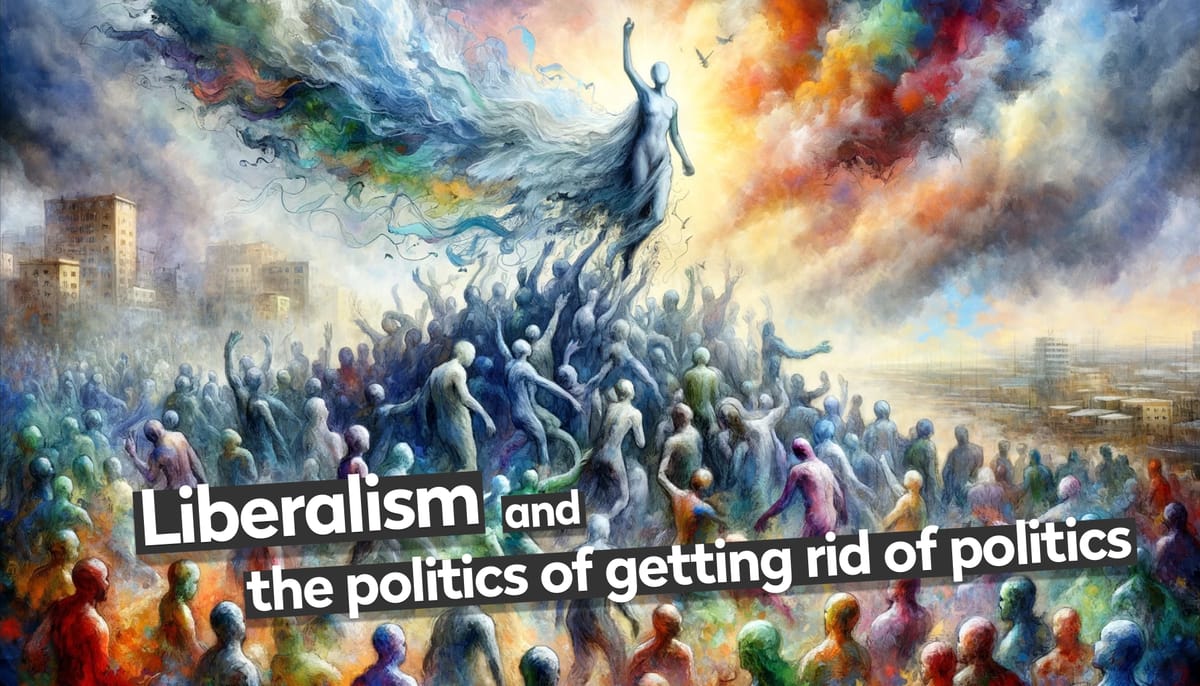
In Part 3 – Everybody hates a tourist: why socio-political theory never gets it right about common people – I examine how many of the foundational metaphors and analogies that most frame our thinking about people and society do not describe the reality of how people actually are, and how such naive analogies limit our capacity for a politics of human flourishing.
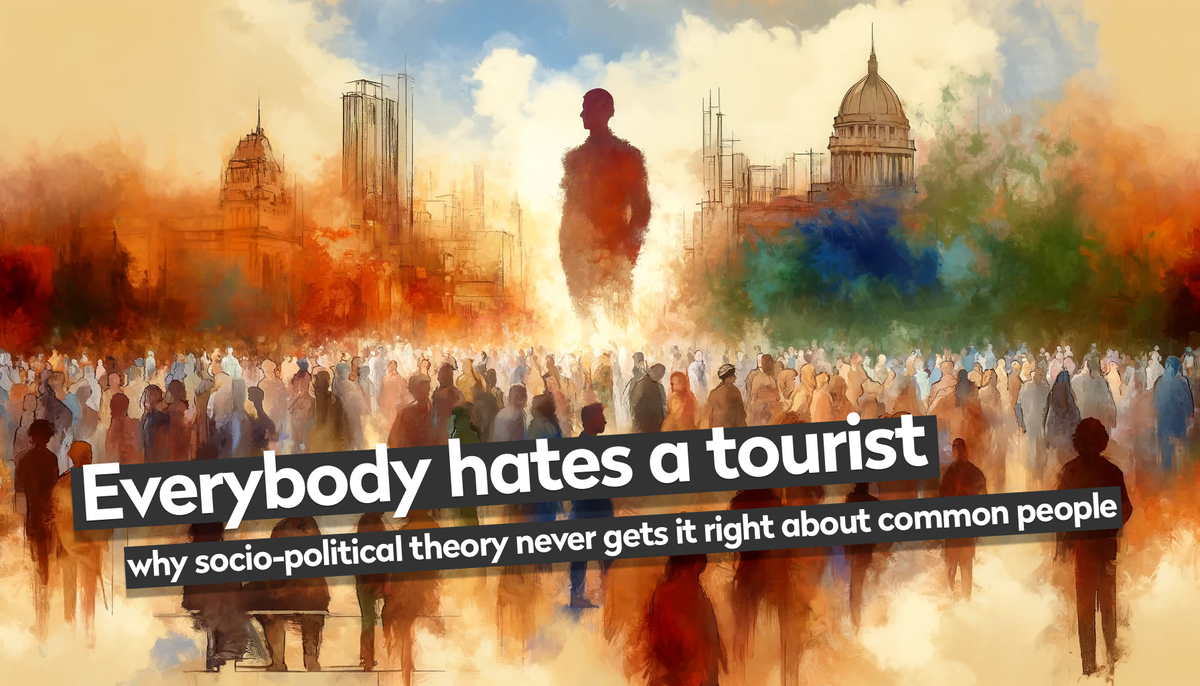
In Part 4 – The Music of Politics – I consider how fresh political arrangements can help us conduct democracy in a way that values and voices harmony amid inevitable discord.
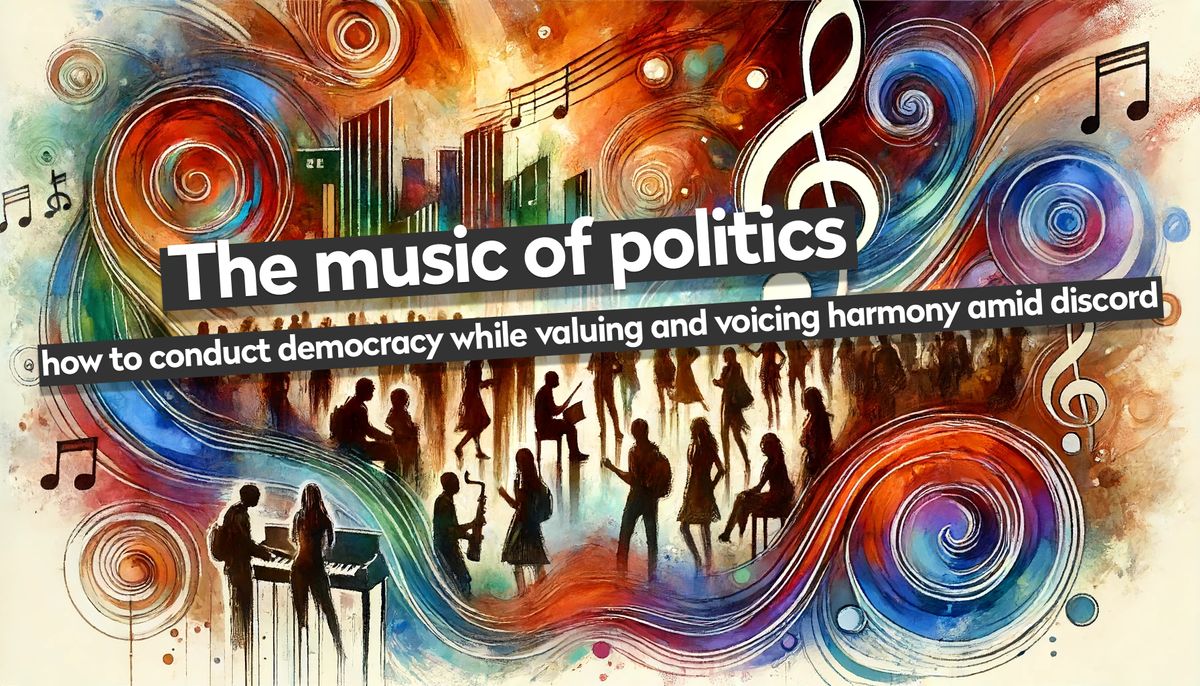
Liberalism and the politics of getting rid of politics
Offline References
[1] Butterfield, Herbert, The Whig Interpretation of History (W. W. Norton, 1965), 11.
[2] Gray, John, Straw Dogs (Farrar, Straus and Giroux, 2007), 3.
[3] Francis Fukuyama, "The End of History?", The National Interest 16 (1989), 4.
[4] Keane, John, The Life and Death of Democracy (Simon and Schuster, 2009), 648–747.
[5] Quoted in Barnes, Louis B, Carl Roland Christensen, and Abby J Hansen. Teaching and the Case Method (1994), 58.

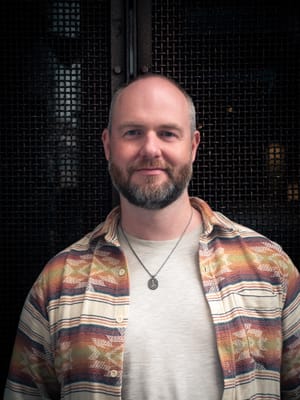
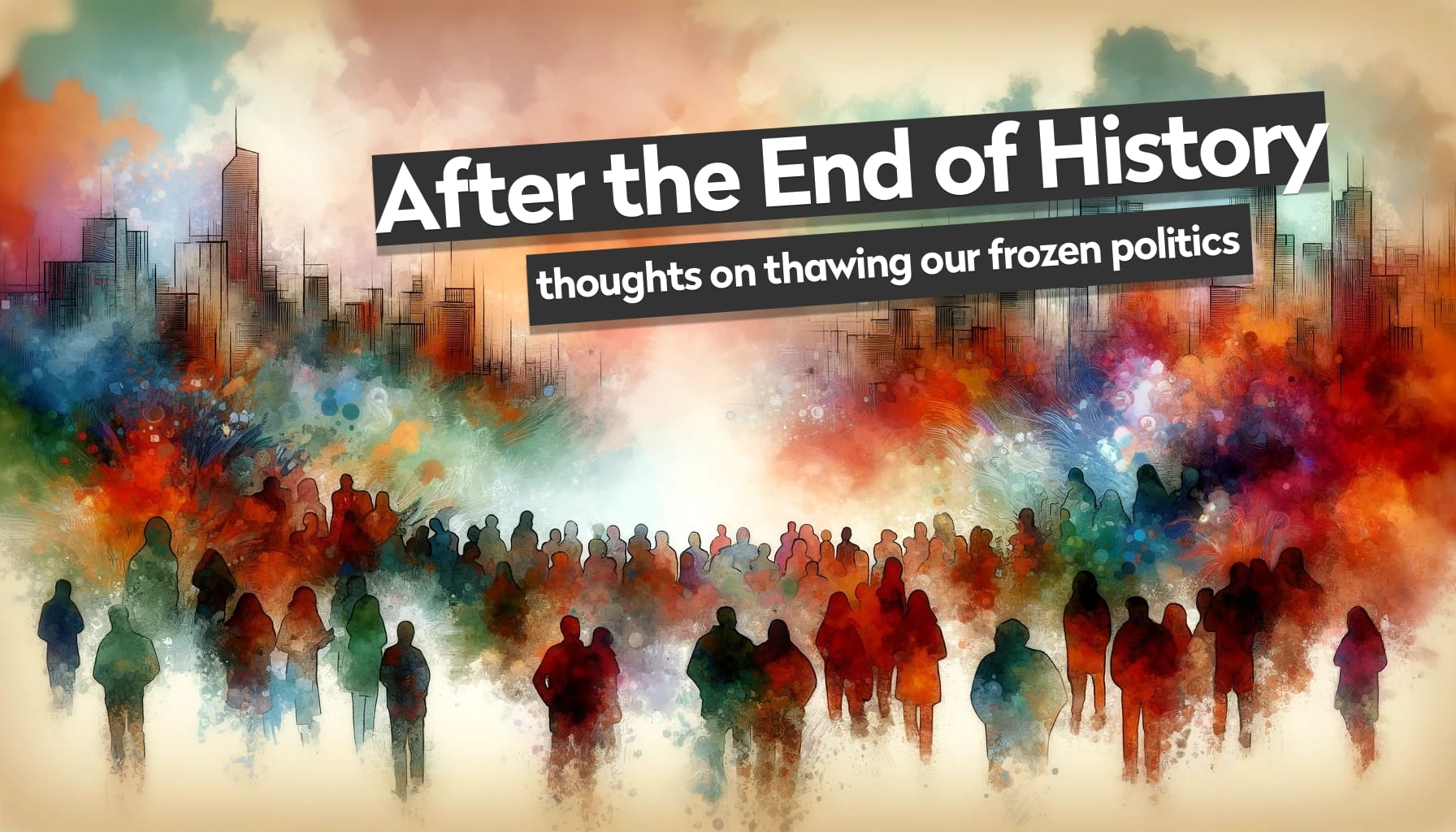






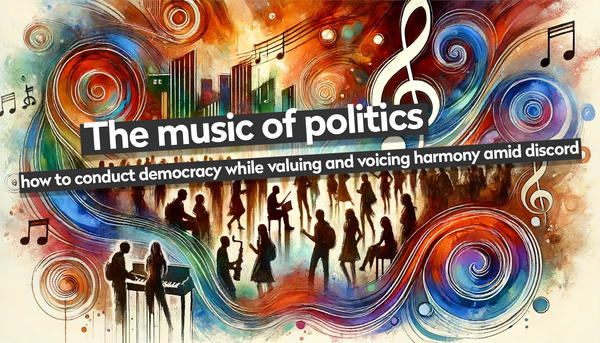


Member discussion